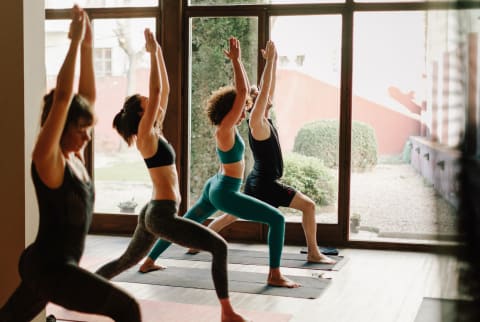Advertisement
Are Fitness Classes The New Faith Institutions? From A Psychologist


When it comes to spirituality, some people find joy in organized religion, others prefer a solo approach in nature, and some don't believe in any higher power—none of these approaches are right or wrong.
And some people, it seems, prefer to sweat. On a recent episode of the mindbodygreen podcast, psychologist David DeSteno, Ph.D., says there's one more place you may consider tapping into your spiritual side: fitness classes.
Are fitness classes the new faith institutions?
"People often say the body is a temple. That typically means you should take care of your body—you should treat it with respect [and] you should exercise," DeSteno explains. "But the body is also a vehicle for spirituality and can be a temple in that way as well."
Think about it: Exercise helps you connect with your own body, clear your mind, and fosters community. Plus, "When you engage in exercise, not only does it release endorphins—the chemical that is responsible for the runner's high—but it also releases endocannabinoids," DeSteno adds. "These endocannabinoids socially bond people1."
Research by Oxford professor Emma Cohen, Ph.D., similarly shows that group exercise promotes social bonding, DeSteno shares. And when people feel more bonded to each other, "They can actually feel spiritual ecstasy when it gets to the right level," he notes.
Some fitness brands even lean into the spiritual experience of group exercise—take SoulCycle, for example. "At SoulCycle, one of the last things people often do at the end of the session is called the 'hill climb,'" DeSteno explains. "It's this way of pushing yourself to a heightened level of exertion and arousal. As those chemicals release, as you're doing this with others, and especially if you have music in a spiritual context, it can put your mind in this moment of deep opening. People will cry, and they'll feel attached to each other."
Essentially: If you've ever felt overcome with emotion during a spinning class, you're certainly not alone.
Especially with institutions like SoulCycle, much of the adoration from its members stems from a connection with the instructors. DeSteno has heard anecdotal accounts of more and more people viewing their fitness instructors as more than just a coach, even asking them for serious life advice.
You could compare the urge to confide in a fitness instructor to those approaching a faith leader. However, DeSteno notes, we generally don't equip fitness instructors with the same counseling training, nor do they necessarily sign up to teach cycling while doubling as a life coach.
Other ways to tap into spirituality
For those who'd rather skip the intense workout classes, don't worry—there are plenty of other ways to tap into your spiritual side. Below, a few ideas:
- Spend more time in nature: Even if you don't live in the countryside, you can prioritize being present outdoors and practicing your connection with the elements. Lay in the grass, walk by the water, plant a tree, and appreciate your inner connection to nature.
- Try meditation: The benefits of meditation depend on the approach. If you want some inner peace, try mindfulness meditation. However, you can experiment with spiritual meditation as well—here's how, plus 11 other methods to test out.
- Practice gratitude: One of the simplest ways to tap into spirituality is by starting a gratitude journal. Writing about the things you're grateful for will help you feel connected to those around you and find presence. You may even want to journal multiple times per day to reap the daily benefits, a concept DeSteno calls "microdosing gratitude."
The takeaway
Fitness classes can provide a moment for you to connect with your body, soul, and with those around you. However, there are plenty of other ways to connect with your spiritual side, including spending time in nature, meditating, and practicing gratitude. As we said up top, spirituality looks different for everyone. Good thing DeSteno shares multiple ways to flex your "soul muscles."
